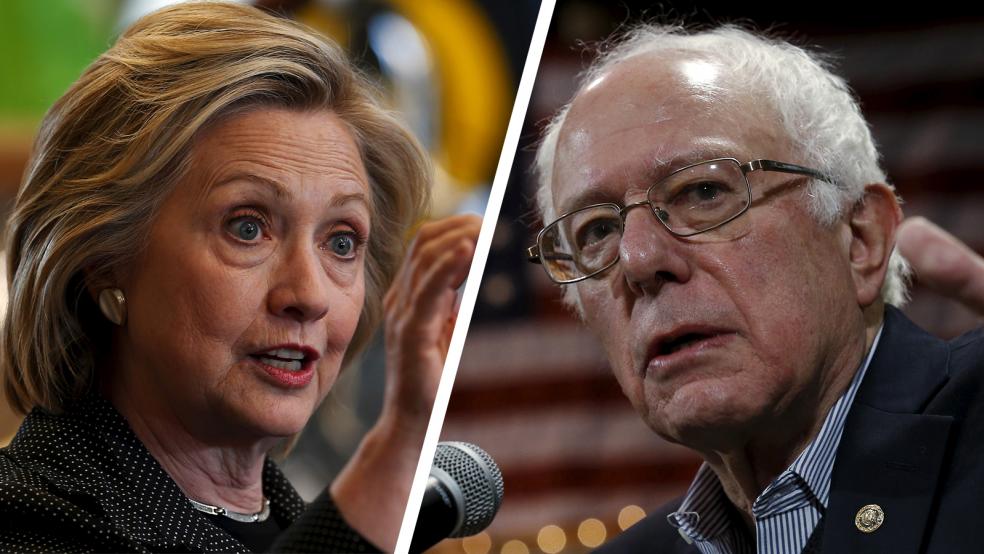Presumptive Democratic presidential nominee Hillary Rodham Clinton over the weekend took a major step towards reconciliation with Sen. Bernie Sanders of Vermont by announcing additional concessions on health care policy more in line with Sanders’s call for universal health care coverage.
While stopping short of Sanders’s plan for a single-payer “Medicare for all” approach that is favored by many liberal Democrats, Clinton on Saturday affirmed her support for allowing people 55 and older to buy into Medicare coverage, the national health insurance program currently available only to seniors 65 and older, The Washington Post reported.
Related: Trump and Clinton Heading for Obamacare Showdown
Clinton also said she would allow states to offer government-operated health plans under the Affordable Care Act – so-called “public options” which she pushed for during her first, unsuccessful campaign for president in 2008. And she said she would seek to expand federal funding by $40 billion over the coming decade for community-based centers that provide primary health care services.
Under that proposal, funding would be doubled for “federally qualified “ health centers, which serve about 25 million low income people in the U.S., many of whom are minorities and reside in hard to reach rural areas, according to Clinton campaign. Sanders made community health care centers a key priority during his primary challenge to Clinton this year and has long championed increased funding for the program.
Taken together with her earlier commitments to address the problems of sharply rising health care premiums, out-of-pocket costs and prescription drug prices, Clinton has managed to draw strong praise from her Democratic rival Sanders.
Sanders reportedly plans to endorse her on Tuesday during a campaign event in Portsmouth, New Hampshire. He told reporters during a conference call yesterday that Clinton had made an “important step forward” towards his vision of a national health program for all Americans.
Related: Clinton Moves Toward Sanders on ‘Medicare for All’
“Together these steps will get us closer to the day when everyone in this country has access to quality affordable health care,” Sanders said.
Without confirming that he would endorse Clinton, Sanders said, "It’s fair to say that the Clinton campaign and our campaign are coming closer and closer together in trying to address the major issues facing this country, which is what my campaign was all about.”
Health care reform was a major source of tension between Clinton and Sanders throughout the Democratic primary season.
Sanders, a self-styled democratic socialist, said it was outrageous that the U.S. was the only major developed country that doesn’t provide a system of health care for all and pressed for a costly single-payer plan that would eventually supplant Obamacare.
What he neglected to acknowledge is that the developed countries that do offer universal health care coverage have three distinct differences from the U.S.
- For the most part, doctors in other developed countries do not pay much for their educations and do not carry the loan burdens that U.S. doctors carry—often in the range of $250,000 or more for specialty practices upon graduation.
- All costs for pharmaceuticals and other services are negotiated and determined by the state.
- Many procedures as well as access to certain treatments and surgeries are rationed or unavailable to those who don’t qualify.
Related: Get Ready for Huge Obamacare Premium Hikes in 2017
Clinton strongly defended President Obama’s signature health insurance program and argued it would be foolish to scrap Obamacare and start over, rather than simply using the platform to try to extend coverage to the 10 percent of Americans who are still uninsured. Yet in late May, she reached out to Sanders and millions of his liberal followers by suggesting during a campaign stop in Virginia that she would be open to allowing some people under the age of 65 to buy into Medicare.
Since then, Clinton and her campaign aides have made a number of important policy concessions to Sanders in an effort to heal sharp divisions within the party. Those have ranged from supporting a $15 an hour minimum wage and expanded Social Security benefits to providing free in-state tuition at public colleges and universities to students from families earning up to $125,000 a year.
Clinton said in a statement Saturday, “We have more work to do to finish our long fight to provide universal, quality, affordable health care to everyone in America. Already, the Affordable Care Act has expanded coverage to 20 million Americans,” she added. “As president, I will make sure Republicans never succeed in their attempts to strip away their care and that the remaining uninsured should be able to get the affordable coverage they need to stay healthy."





